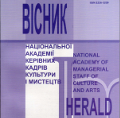ФІЛОСОФСЬКА ГЕЛОТОЛОГІЯ: ПРОБЛЕМИ ТА ПЕРСПЕКТИВИ
PHILOSOPHICAL HENOTOLOGY: PROBLEMS AND PROSPECTS
Author(s): Olena Sergeevna Kolesnyk, Maryna Borisivna StoliarSubject(s): Social Philosophy, Special Branches of Philosophy, Phenomenology
Published by: Національна академія керівних кадрів культури і мистецтв
Keywords: paradigms of helotology; principles of proliferation; incompleteness; incompleteness of the theory; heterogeneity of laughter;
Summary/Abstract: The purpose of the article is to identify the main obstacles that for a long time have prevented the formation of the philosophy of laughter as a separate direction, as well as the main paradigms of the theoretical understanding of laughter. The methodology of the research is based on the interdisciplinary integration of leading methods of modern cultural studies and philosophy. Based on postmodern practices of intertextuality and deconstruction, in particular the deconstruction of the classical essential philosophy of laughter, the article demonstrates the complementarity and practically equal value of various approaches to the explanation of the phenomenon of laughter. General scientific research methods as analysis and synthesis are also used. The scientific novelty of the work consists in clarifying the methodological foundations of the construction of modern theoretical helotology. Conclusions. The contemporary theory of laughter should be a synthesis of various methodological discourses, based on the concept of heterogeneity of laughter, and the recognition of various “laughs”. In this context, a metamodern cumulative model is adequate: nothing in the history of the study of laughter is “outdated” or “false” – except for the reductionist methodology, which tries to find once and for all a single, forever defined “essence of laughter”. Since, as was shown in the work, laughter is a multifaceted phenomenon, understanding its various forms is a permanent process, and therefore, the topic has unlimited prospects for further research.
Journal: Вісник Національної академії керівних кадрів культури і мистецтв
- Issue Year: 2024
- Issue No: 1
- Page Range: 25-31
- Page Count: 7
- Language: Ukrainian

